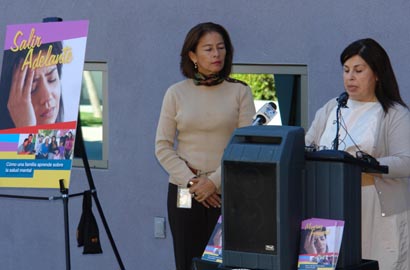Fotonovela Seeks to Engage Latinos and Encourage Them to Seek Help

One in four Latino adults and one in five children in San Diego County are likely to experience major depression or another mental disorder on any given year; however, stigma, culture and language barriers keep many from seeking treatment.
A bilingual fotonovela—Salir Adelante: Cómo una familia aprende sobre la salud mental (Moving Forward: How a Family Learns About Mental Health)—was published by the San Diego County Health and Human Services Agency to educate Latinos about mental health.
“These are stressful times and we want to encourage people to seek the help they need,” said County Supervisor Greg Cox, District 1.” That starts with getting people to feel they can talk with their friends and loved ones about any troubles they may be having.”
About 40,000 English and Spanish fotonovelas are available at 90 locations throughout the region, including County libraries, mental health centers, and family resource centers. The fotonovela will also be available at the six Northgate Markets throughout the county.
Fotonovelas are extremely popular among Latinos. A fotonovela is a booklet with pictures and dialogue boxes that often tell a dramatic story with a moral lesson.
The fear of rejection and discrimination, coupled with shame and self-stigma, are some of the barriers that prevent Latinos with a mental disorder from accessing needed mental health services. Many Latinos view a mental disorder as a personal weakness.
In Salir Adelante, a Latino family knows that something is wrong with Maria Ester, the leading character. However, Maria Ester and her husband Luis are hesitant to get help due to shame and fear that people will think she is crazy. Luis’ mother, Doña Prudencia, consults with the family priest and convinces her son to talk to his wife and encourage Maria Ester to seek help. She does.
“People should not be afraid or embarrassed to get help,” said Piedad Garcia, Ed.D., LCSW, Director of the County’s Adult and Older Adult Mental Health Services. “We want Latinos suffering from a mental health condition to know that they are not alone. We are here to help.”
People suffering from a mental illness can access services by calling the County’s 24-hour, multi-lingual Access and Crisis Line at (800) 479-3339.